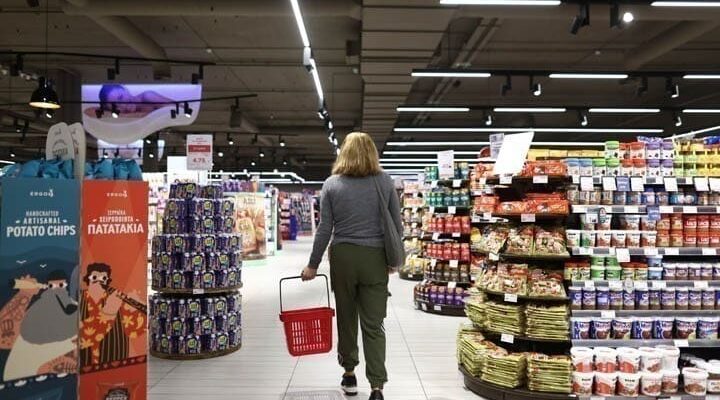Inflation in Greece grew 2.7 percent year-on-year, up from 2.3 percent in June, despite the decline in supermarket prices, studies find.
According to the Hellenic Statistics Authority (ELSTAT) energy and services were the main factors driving inflationary pressure, but food prices also remain high, with some rising significantly month-on-month.
Service prices shot up in air travel tickets (18.4 percent year-on-year), health insurance premiums (14 percent) and hotel rooms (12.6 percent). In energy, the price of natural gas shot up 23.4 percent after a long period of decline.
Food prices rose less than the average (2.4 percent in July from 2.1 percent in July), but their weighing on the price index is quite important and they form a large part of household expenditure, where every price rise is painfully felt.
Olive oil (56.7 percent) rose precipitously, followed by soft drinks and fruit juices (8.6 percent), fresh fish (8.4 percent), cereals (7.4 percent), chocolate products and other sweets (4.1 percent) and fresh vegetables (3.5 percent).
Some of those products rose mainly month-on-month: cereal by 6 percent, fish by 3.6 percent, yogurt (2.5 percent) and fresh milk (2.1 percent).
Among services, the greatest month-on-month price hikes were in electricity (9.5 percent), plane tickets (7.3 percent), and hotel rooms (3.5 percent).
Prices in Greece’s supermarkets resist inflation rise
Despite the rise in overall inflation, the prices of products in Greek supermarkets saw an average year-on-year decline of 1.56 percent, according to a new survey by the Institute of Consumer Goods Retail Research (IELKA).

The study, which examined 23 supermarket product categories across supermarkets in Greece, found prices declining across 13 categories.
The biggest decline was seen in the fresh fruit and vegetables category (-7.34 percent) as it benefited from better weather conditions compared to 2023.
Prices of detergents and cleaning products, stationery, cosmetics and toiletries registered a decline of 6.32 percent. Elsewhere, food and pet food prices were down 5.19 percent, and the baby and children’s food category also witnessed a 3.72 percent decline.
Ten product categories witnessed an increase in prices due to seasonal demand and increased international raw material prices, such as sugar and cocoa prices, and other production costs, IELKA said.
In recent months, prices have stabilized in large food stores due to the high volume of products they handle, economies of scale, organizational and technological readiness, and the availability of a range of private-label products, IELKA noted.
Intervention from the government has also helped stabilize prices as supermarket chains operate within a strict institutional framework.
More offers and discounts in the organized retail channel have helped reduce the final prices of products.
The study also found the sales share of private-label products to be higher in larger supermarket chains.



